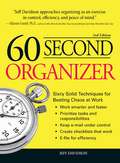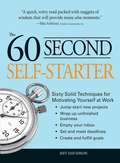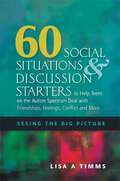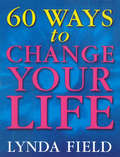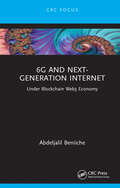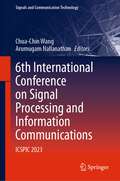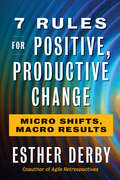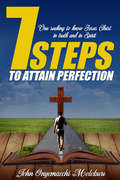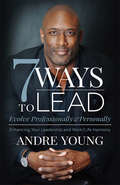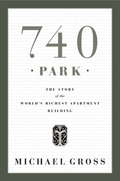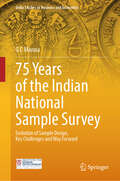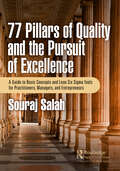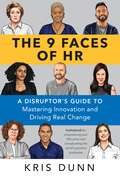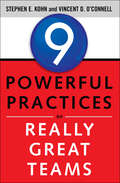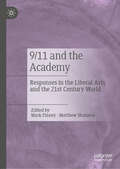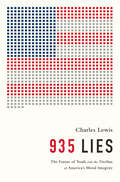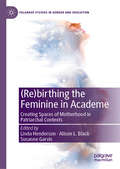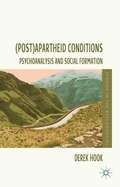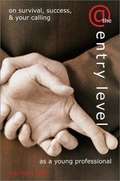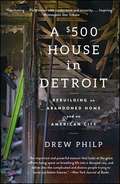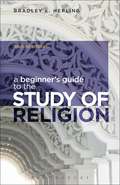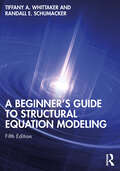- Table View
- List View
60 Second Organizer: Sixty Solid Techniques for Beating Chaos at Work (2nd Edition)
by Jeff DavidsonWith sixty simple, immediate techniques, he shows you how to get your workplace organized, streamline your workday, and boost your productivity and job satisfaction.
60 Second Self-Starter
by Jeff DavidsonDoes your desk look the scene of an explosion?Is your computer crowded with pointless files?Are the tools you need always buried under piles of junk?If so, Jeff Davidson has the solutions for you. With sixty simple, immediate techniques, he shows you how to get your workplace organized, streamline your workday, and boost your productivity and job satisfaction. With this handy manual by your side, you can banish chaos from your cubicle forever!
60 Second Self-Starter
by Jeff DavidsonDoes your desk look the scene of an explosion?Is your computer crowded with pointless files?Are the tools you need always buried under piles of junk?If so, Jeff Davidson has the solutions for you. With sixty simple, immediate techniques, he shows you how to get your workplace organized, streamline your workday, and boost your productivity and job satisfaction. With this handy manual by your side, you can banish chaos from your cubicle forever!
60 Second Self-Starter: Sixty Solid Techniques to get motivated, get organized, and get going in the workplace.
by Jeff DavidsonDoes your desk look the scene of an explosion?Is your computer crowded with pointless files?Are the tools you need always buried under piles of junk?If so, Jeff Davidson has the solutions for you. With sixty simple, immediate techniques, he shows you how to get your workplace organized, streamline your workday, and boost your productivity and job satisfaction. With this handy manual by your side, you can banish chaos from your cubicle forever!
60 Social Situations and Discussion Starters to Help Teens on the Autism Spectrum Deal with Friendships, Feelings, Conflict and More
by Lisa A. TimmsTeenagers and older children on the autistic spectrum are, like the rest of us, surrounded by complex social codes and rules that govern everyday interaction. Interpreting these and reading social cues such as sarcasm, idioms and body language often presents a real challenge, but this book of realistic and thought-provoking stories can help. Designed with both parent and child in mind, every story outlines a real-life situation that young people on the spectrum are likely to encounter. Each of these is followed with questions such as 'what else might he have done?', 'how do you think she felt?' and 'why do you think they were upset?', along with practical tips for parents on how to facilitate constructive discussions. As children consider these questions with adults, they begin to put themselves into someone else's shoes and are encouraged to think about how their actions and behaviour may affect those around them, gaining invaluable skills and understanding that will be transferable to everyday life situations. Packed with 60 stories exploring real-life situations, this book will be an essential tool for parents, caregivers, teachers, and anyone else wishing to enable young people on the autistic spectrum to improve their social skills.
60 Ways To Change Your Life
by Lynda FieldThis little book will inspire you to embrace change and face life with a positive attitude. It will help you take control of your destiny and change your life for the better - forever.
6G and Next-Generation Internet: Under Blockchain Web3 Economy
by Abdeljalil BeniicheThe sixth generation (6G) of wireless cellular networks is expected to incorporate the latest developments in network infrastructure and emerging advances in technology. It will not only explore more spectrum at high-frequency bands but also converge driving technological trends, including connected robotics, artificial intelligence (AI), and blockchain technologies. There is also a strong notion that the nature of mobile terminals will change, whereby intelligent mobile robots are anticipated to play a more important role. Importantly, 6G will become more human-centered than 5G, which primarily focused on industry verticals. This book explores the human-centeredness of blockchain and Web3 economy for the 6G era. Aimed at graduate students, network and blockchain researchers, professionals, engineers, and practitioners, this book discusses the symbiosis of blockchain with other key technologies such as AI and robots, while putting the focus on the Tactile Internet for advanced human-to-machine interaction. By focusing on the research field of robonomics in the 6G Era, which studies the social integration of robots into the economy and human society, the book puts the various developed ideas and concepts into the perspective of the future Super Smart Society 5.0.
6th International Conference on Signal Processing and Information Communications: ICSPIC 2023 (Signals and Communication Technology)
by Chua-Chin Wang Arumugam NallanathanThis book presents the proceedings of the 6th International Conference on Signal Processing and Information Communications (ICSPIC 2023), which was held in Singapore, on February 25-27, 2023. The conference aims to provide a leading international forum for researchers, practitioners, and professionals from the industry, academia and government to share their new ideas, progresses and achievements in signal processing and information communications. The contributions focus on the latest advances, trends and future challenges in analog and mixed signal processing, design and implementation of signal processing systems, compressive sensing, machine learning methods for communications and signal processing, multimedia signal processing, natural language processing, next generation mobile communications, nonlinear signal processing, optical communications, parallel and distributed processing, and more.
7 Rules for Positive, Productive Change: Micro Shifts, Macro Results
by Esther DerbyChange is difficult but essential—Esther Derby offers seven guidelines for change by attraction, an approach that draws people into the process so that instead of resisting change, they embrace it. Even if you don't have change management in your job description, your job involves change. Change is a given as modern organizations respond to market and technology advances, make improvements, and evolve practices to meet new challenges. This is not a simple process on any level. Often, there is no indisputable right answer, and responding requires trial and error, learning and unlearning. Whatever you choose to do, it will interact with existing policies and structures in unpredictable ways. And there is, quite simply, a natural human resistance to being told to change. Rather than creating more rigorous preconceived plans or imposing change by decree, agile software developer turned organizational change expert Esther Derby offers change by attraction, an approach that is adaptive and responsive and engages people in learning, evolving, and owning the new way. She presents a set of seven heuristics—guides to problem-solving—that empower people to achieve outcomes within broad constraints using their personal ingenuity and creativity. When you work by attraction, you give space and support for people to feel the loss that comes with change and help them see what is valuable about the future you propose. Resistance fades because people feel there is nothing to push against—only something they want to move toward. Derby's approach clears the fog to provide a new way forward that honors people and creates safety for change.
7 Steps to Attain Perfection: One seeking to know Jesus Christ in truth and in Spirit
by John Molokwu7 Steps To Attain Perfection, an embodiment of rudimentary guiding principles capturing the essence of being Born Again, was conceived out of a nurtured desire spanning 11 years of tuning and fine-tuning its contents to equip a believer with necessary steps taking them on a purposeful journey through life's unpredictable experiences. It begins the moment someone takes the decisive step to accept Christ as their Lord and Saviour to fulfilling their calling in God's vineyard. 7 Steps To Attain Perfection is equipped with biblical citations, anecdotes, and metaphorical connotations meant to expose your thoughts to new possibility of attaining perfection in Christ Jesus. It relates to every believer's struggle for acceptance and respect in a world of perverseness, deceitfulness, slothfulness, and actus reus. 7 Steps To Attain Perfection remains a great privilege for me having been inspired to tap from the wealth of wisdom, knowledge and understanding endowed by the Holy Spirit flowing through the ‘Still Small Voice' as I listened in the Spirit and penned down the Words as the Spirit gave me inspiration. Anyone applying the teachings in this book will transform their life through becoming changed for the better according to John 15:1-5.
7 Ways to Lead: Evolve Professionally & Personally
by Andre Young<p>A common sense guide to becoming a better leader and achieving a healthy work/life balance in order to live your best life.<p> <p>The number one complaint from many companies is “Our leaders don’t know how to lead!” Why would they? Most people are promoted because they did one thing really well or outlasted their “addicted to average” co-workers/teammates, not because they knew how to lead. Andre Young’s favorite example is “You sold a million dollars worth of product . . . You are now the Sales Manager.” They haven’t proved they can manage or lead anyone; they’ve only proven they can sell a million dollars worth of product . . . their way.<p> <p>Work/Life Harmony is more important now than it’s ever been. The notion of leaving home at the door before entering work and leaving work at the door when entering home is obsolete. The fact that cell phones are always accessible means significant others, relationships, and outside life now enter work with every employee . . . ALL DAY. So, when things are bad intimately, parentally, and socially, it shows up at work with employees trying to do their job in between responding to ten pages of “Hate Texts.” In contrast, when that same employee returns home, their phone may continue to ring with work emails, work texts, etc. If they respond, they’ve effectively communicated it’s okay to invade their time. If they don’t, it doesn’t erase the anxiety of not responding or knowing a pile of work is building up. There may not be a true balance between both realms, but 7 Ways to Lead helps leaders find and create harmony between the two.<p>
740 Park: The Story of the World's Richest Apartment Building
by Michael GrossFor seventy-five years, it's been Manhattan's richest apartment building, and one of the most lusted-after addresses in the world. One apartment had 37 rooms, 14 bathrooms, 43 closets, 11 working fireplaces, a private elevator, and his-and-hers saunas; another at one time had a live-in service staff of 16. To this day, it is steeped in the purest luxury, the kind most of us could only imagine, until now. The last great building to go up along New York's Gold Coast, construction on 740 Park finished in 1930. Since then, 740 has been home to an ever-evolving cadre of our wealthiest and most powerful families, some of America's (and the world's) oldest money--the kind attached to names like Vanderbilt, Rockefeller, Bouvier, Chrysler, Niarchos, Houghton, and Harkness--and some whose names evoke the excesses of today's monied elite: Kravis, Koch, Bronfman, Perelman, Steinberg, and Schwarzman. All along, the building has housed titans of industry, political power brokers, international royalty, fabulous scam-artists, and even the lowest scoundrels.The book begins with the tumultuous story of the building's construction. Conceived in the bubbling financial, artistic, and social cauldron of 1920's Manhattan, 740 Park rose to its dizzying heights as the stock market plunged in 1929--the building was in dire financial straits before the first apartments were sold. The builders include the architectural genius Rosario Candela, the scheming businessman James T. Lee (Jacqueline Kennedy Onassis's grandfather), and a raft of financiers, many of whom were little more than white-collar crooks and grand-scale hustlers. Once finished, 740 became a magnet for the richest, oldest families in the country: the Brewsters, descendents of the leader of the Plymouth Colony; the socially-registered Bordens, Hoppins, Scovilles, Thornes, and Schermerhorns; and top executives of the Chase Bank, American Express, and U.S. Rubber. Outside the walls of 740 Park, these were the people shaping America culturally and economically. Within those walls, they were indulging in all of the Seven Deadly Sins. As the social climate evolved throughout the last century, so did 740 Park: after World War II, the building's rulers eased their more restrictive policies and began allowing Jews (though not to this day African Americans) to reside within their hallowed walls. Nowadays, it is full to bursting with new money, people whose fortunes, though freshly-made, are large enough to buy their way in. At its core this book is a social history of the American rich, and how the locus of power and influence has shifted haltingly from old bloodlines to new money. But it's also much more than that: filled with meaty, startling, often tragic stories of the people who lived behind 740's walls, the book gives us an unprecedented access to worlds of wealth, privilege, and extraordinary folly that are usually hidden behind a scrim of money and influence. This is, truly, how the other half--or at least the other one hundredth of one percent--lives.
75 Years of the Indian National Sample Survey: Evolution of Sample Design, Key Challenges and Way Forward (India Studies in Business and Economics)
by G C MannaThis book gives an overview of the Indian National Sample Survey (NSS) with a summarization of the salient features of the survey methodology adopted in the surveys, experiences gathered on the strengths and limitations of the data collected through the NSS and way forward to address some critical data gaps for further strengthening the NSS database. To fulfil the requirements of a diverse set of readers, the book also highlights the lessons gathered through some important pilot surveys that the NSS had conducted apart from containing a chapter on some global / best survey practices so that the book can truly be used as a reference material by the survey practitioners across the globe. It will also be of interest to a variety of other readers including the students, researchers, planners, and policymakers in addition to the survey organizations across the globe.
77 Pillars of Quality and the Pursuit of Excellence: A Guide to Basic Concepts and Lean Six Sigma Tools for Practitioners, Managers, and Entrepreneurs
by Souraj SalahThis book offers a basic and practical guide for a manager, quality practitioner, or anyone interested in learning and understanding the fundamental principles, concepts, tools, and techniques of quality management and process improvement. This book enables managers to have a strong foundation for effective management and improvement of operations. It strengthens quality practitioners’ approach to people, products, or services and process improvement, to influence without authority. It provides practitioners with a comprehensive understanding of the contemporary concepts of quality, guiding principles, and quality tools and techniques and on successfully implementing them. It helps enhance how practitioners perform their work and inspires them to strive for excellence.The book begins with an introduction and an overview of quality, followed by listing and explaining the selected 77 pillars (basic principles, concepts, and tools) of quality, grouped under the themes of quality, Six Sigma, and Lean Management. It examines the logical understanding of these pillars and how to implement them, providing practical examples and beneficial real case studies. The stories are based on the learning and practical experience of the author—a certified Lean Six Sigma Master Black Belt, a quality manager, and a university lecturer.This book benefits employees, partners, and customers of any organization, offering a great reference for practitioners and academics alike. It serves as a call to reflect on basic quality pillars first, before embarking on a quality improvement journey. It provides a solid foundation for managers and practitioners to exceed their customers’ expectations and excel in managing their business operations.
9 Faces of HR: A Disruptor's Guide to Mastering Innovation and Driving Real Change
by Kris DunnEvery HR professional can be classified as one of nine "Faces" based on career level and ability to innovate and drive change-knowing yours can transform your career. In The 9 Faces of HR, popular blogger and CHRO Kris Dunn introduces a powerful framework that helps HR professionals identify their "face" through a behavioral assessment, then use that insight to drive personal and professional growth. Covering career paths, behavioral traits, ROI potential, industry trends and demand for each face, the book offers a strategic lens for understanding how HR roles vary, and how to move from where you are to where you want to be.Ideal for HR practitioners at all levels, this is a blunt, practical and empowering playbook for building high-impact careers and teams.
9 Powerful Practices of Really Great Teams
by Stephen E. Kohn Vincent D. O'ConnellIncreasingly, organizations count on project teams to develop products and deliver services to their customers. Consequently, effective teamwork and team leadership are integral components of an organization's success. In 9 Powerful Practices of Really Great Teams, Stephen E. Kohn and Vincent D. O'Connell define the essence of superior performance by project teams at work, and identify nine attributes of team membership and team leadership that set the stage for accomplishment of group objectives. Kohn and O'Connell bring these proven strategies to life with real-world examples drawn from decades of experience.
9/11 and the Academy: Responses in the Liberal Arts and the 21st Century World
by Mark Finney Matthew ShannonThis book explores the impact of September 11, 2001 upon interdisciplinary scholarship and pedagogy in the liberal arts. Since “the day that changed everything”, many forces have transformed institutions of higher education in the United States and around the world. The editors and contributors consider the extent to which the influence of 9/11 was direct, or part of wider structural changes within academia, and the chapters represent a wide range of interdisciplinary perspectives on how the production and dissemination of knowledge has changed since 2001. Some authors demonstrate that new forms of inquiry, exploration, and evidence have been created, much of it focused on the causes, consequences, and meanings of the terror attacks. Others find that scholars sought to understand 9/11 by applying old theoretical and empirical insights and reviving lines of questioning that have become relevant. The contributors also examine the impact of 9/11 on higher education administration and liberal arts pedagogies. Among the many collective findings is that scholars in the humanities and critical social sciences have been most attentive to the place of 9/11 in society and academic culture. This eclectic collection will appeal to students and scholars interested in the place of the liberal arts in the twenty-first century world.
935 Lies: The Future of Truth and the Decline of America's Moral Integrity
by Charles LewisFacts are and must be the coin of the realm in a democracy, for government OC of the people, by the people and for the people, OCO requires and assumes to some extent an informed citizenry. Unfortunately, for citizens in the United States and throughout the world, distinguishing between fact and fiction has always been a formidable challenge, often with real life and death consequences. But now it is more difficult and confusing than ever. The Internet Age makes comment indistinguishable from fact, and erodes authority. It is liberating but annihilating at the same time. For those wielding power, whether in the private or the public sector, the increasingly sophisticated control of information is regarded as utterly essential to achieving success. Internal information is severely limited, including calendars, memoranda, phone logs and emails. History is sculpted by its absence. Often those in power strictly control the flow of information, corroding and corrupting its content, of course, using newspapers, radio, television and other mass means of communication to carefully consolidate their authority and cover their crimes in a thick veneer of fervent racialism or nationalism. And always with the specter of some kind of imminent public threat, what Hannah Arendt called OCyobjective enemies. OCOOCO An epiphanic, public comment about the Bush OC war on terrorOCO years was made by an unidentified White House official revealing how information is managed and how the news media and the public itself are regarded by those in power: OC You journalists live] OC in what we call the reality-based community. But] thatOCOs not the way the world really works anymore. WeOCOre an empire now, and when we act, we create our own reality . . . weOCOre historyOCOs actors . . . and you, all of you, will be left to just study what we do. OCO And yet, as aggressive as the Republican Bush administration was in attempting to define reality, the subsequent, Democratic Obama administration may be more so. Into the battle for truth steps Charles Lewis, a pioneer of journalistic objectivity. His book looks at the various ways in which truth can be manipulated and distorted by governments, corporations, even lone individuals. He shows how truth is often distorted or diminished by delay: truth "in time" can save terrible erroneous choices. In part a history of communication in America, a cri de coeur for the principles and practice of objective reporting, and a journey into several notably labyrinths of deception, "935 Lies" is a valorous search for honesty in an age of casual, sometimes malevolent distortion of the facts.
: Creating Spaces of Motherhood in Patriarchal Contexts (Palgrave Studies in Gender and Education)
by Susanne Garvis Alison L. Black Linda HendersonThis book engages expansively with the concept of motherhood in academia, to offer insights into re-imagining a more responsive higher education. Written collaboratively as international, interdisciplinary and intergenerational collectives, the editors and contributors use various ways of understanding ‘motherhood’ to draw attention to – and disrupt – the masculine structures currently defining women’s lives and work in the academy. Shifting the focus from patriarchal understandings of academe, the narratives embrace and champion feminist and feminine scholarship. The book invites the reader to question what can be conceived when motherhood is imagined more expansively, through lenses traditionally silenced or made invisible. This pioneering volume will be of interest and value to feminist scholars, as well as those interested in disrupting patriarchal academic structures.
: Psychoanalysis and Social Formation (Studies in the Psychosocial)
by Derek Hook(Post)Apartheid Conditions.
@ The Entry Level: On Survival, Success, & Your Calling As A Young Professional
by Michael BallCash, Coercion, Cons, Whatever it takes to get unsuspecting grads to sign that offer letter, Corporate America is game. Because once it's finally plain that the entry level, in fact, is a hellish and demeaning place of grunt-work, brown-nosing, and mental drool, the ink's already dry and the newbies in bed. Way in, what with the pressure to keep post-college resumes stocked with "respectable" Fortune 500 firms. Instead, most early-stage workers end burying their dreams underneath their paycheck, suffering quietly through the frustration, depression, and thoughts of beating their manager with a stick. No more. @ The Entry Level is designed to lead you through the psychologies, philosophies, and strategies for succeeding in business' basement, but with the single-minded purpose of finding the work you were made to do. It's the first book ever to dispel the myths, whisper the tricks, and supply the tools to help you as a young professional: *Manage the transition from college to work *Negotiate the Entry Level Rite of Passage Navigate office politics and build your personal brand *Earn the promotion or transfer with the right fit *Locate a sturdy work - life balance *Uncover your values to make intelligent, healthy career decisions *Gain the courage to follow your passion and find your calling Further taking a hard look at the seduction of money, the silliness of company loyalty, and the side-effects of waiting until midlife to figure out what your job should mean, this is the indispensable guide for career freshmen seeking a deeper, richer working life. And for those who just need to keep breathing. Michael Ball is the founder and CEO of Career Freshman Company, an organization dedicated to helping young professionals discover success, passion, and fulfillment in their work. A disillusioned Big Five (now Four) consulting veteran and Silicon Valley startup survivor, he's found his own calling as an author, speaker, and career coach to college students and corporate grunts. He lives in Los Angeles.
A $500 House in Detroit: Rebuilding an Abandoned Home and an American City
by Drew PhilpDrew Philp, an idealistic college student from a working-class Michigan family, withdraws from the comforts of life on a university campus in search of a place to live where he can make a difference. He sets his sights on Detroit, the failed metropolis of abandoned buildings, widespread poverty, and rampant crime—a complicated source of national fascination, often stereotyped and little understood. Arriving with no job, no friends, and no money, Philp is naïvely determined to fix the huge, broken city with his own hands and on his own terms. A year later, he saves up and buys a ramshackle house for five hundred dollars in the east side neighborhood known as Poletown and moves in. Philp gets what he pays for. The roomy Queen Anne he now owns has been abandoned for a decade and is little more than a clapboard shell on a crumbling brick foundation, filled with heaping piles of trash (including most of a chopped-up minivan), and missing windows, heat, water, electricity, and a functional roof. The landscape of the surrounding neighborhood resembles an urban prairie: overgrown fields dotted with houses that haven’t been demolished or burned to the ground—some of them well-maintained by Detroiters who have chosen to remain in the city, but many, like the Queen Anne, left vacant and in complete disrepair. Based on a BuzzFeed essay that resonated with millions of readers, A $500 House in Detroit is Philp’s raw and earnest account of rebuilding everything but the frame of his house, nail by nail and room by room. It’s also the story of a young man finding his footing in the city, the country, and his own generation. As he assimilates into the community of Detroiters around him, Philp guides readers through the city’s vibrant history and engages in urgent conversations about gentrification, racial tensions, and class warfare. We witness his concept of Detroit shift, expand, and evolve as his plan to save the city gives way to a life forged from political meaning, personal connection, and collective purpose. Part social history, part brash generational statement, part comeback story, A $500 House in Detroit is an intimate account of the tentative revival of an American city—home by home and person by person—and a glimpse at a new way forward for generations to come.
A Battle Plan for Supporting Military Families: Lessons for the Leaders of Tomorrow (Risk and Resilience in Military and Veteran Families)
by David S. Riggs Linda Hughes-Kirchubel Shelley MacDermid WadsworthThis unique reference integrates knowledge culled from fifteen years of U. S. deployments to create an action plan for supporting military and veteran families during future conflicts. Its innovative ideas stretch beyond designated governmental agencies (e. g. , Department of Defense, VA) to include participation from, and possible collaborations with, the business/corporate, academic, advocacy, and philanthropic sectors. Contributors identify ongoing and emerging issues affecting military and veteran families and recommend specific strategies toward expanding and enhancing current programs and policy. This proactive agenda also outlines new directions for mobilizing the research community, featuring strategies for addressing institutional challenges and improving access to critical data. Included in the coverage: Lessons learned inside the Pentagon. Merging reintegration streams for veterans and military families. The unique role of professional associations in assisting military families: a case study. Philanthropy for military and veteran families: challenges past, recommendations for tomorrow. Rules of engagement: media coverage of military families during war. Designing and implementing strategic research studies to support military families. A Battle Plan for Supporting Military Families is of immediate usefulness to leaders, professionals, and future professionals in interdisciplinary academic, governmental, advocacy, and philanthropic areas of focus interested in the theoretical, practical, and real-life concerns and needs of military-affiliated families.
A Beginner's Guide To The Study Of Religion
by Bradley L. HerlingHow should we understand and interpret the strange but familiar thing that we call "religion"? What are the foundations of a methodical approach to this subject, and what theoretical tools are available to students who are new to this area of inquiry? A Beginner's Guide to the Study of Religion provides an accessible, wide-ranging introduction to theories and basic methodology in the field. Now in its second edition and updated throughout, this concise but comprehensive book includes:- - A case for the urgency and relevance of studying religion today - Discussion of the role and perspective of the student of religion - Description of the nature of theory and its function - An accessible survey of classic theorists in the modern study of religion - Feature boxes highlighting essential quotations and guiding principles for application of theories An expanded consideration of contemporary issues in the field, including gender, sexuality, race, ethnicity, globalization, violence, science, and new media. - Recommended further reading A Beginner's Guide to the Study of Religion offers a thorough but concise body of material suitable for introductory courses on the study of religion, or to provide theoretical context for survey courses. Study questions and worksheets can be found on the book's webpage.
A Beginner's Guide to Structural Equation Modeling
by Tiffany A. Whittaker Randall E. SchumackerA Beginner’s Guide to Structural Equation Modeling, fifth edition, has been redesigned with consideration of a true beginner in structural equation modeling (SEM) in mind. The book covers introductory through intermediate topics in SEM in more detail than in any previous edition. All of the chapters that introduce models in SEM have been expanded to include easy-to-follow, step-by-step guidelines that readers can use when conducting their own SEM analyses. These chapters also include examples of tables to include in results sections that readers may use as templates when writing up the findings from their SEM analyses. The models that are illustrated in the text will allow SEM beginners to conduct, interpret, and write up analyses for observed variable path models to full structural models, up to testing higher order models as well as multiple group modeling techniques. Updated information about methodological research in relevant areas will help students and researchers be more informed readers of SEM research. The checklist of SEM considerations when conducting and reporting SEM analyses is a collective set of requirements that will help improve the rigor of SEM analyses. This book is intended for true beginners in SEM and is designed for introductory graduate courses in SEM taught in psychology, education, business, and the social and healthcare sciences. This book also appeals to researchers and faculty in various disciplines. Prerequisites include correlation and regression methods.
